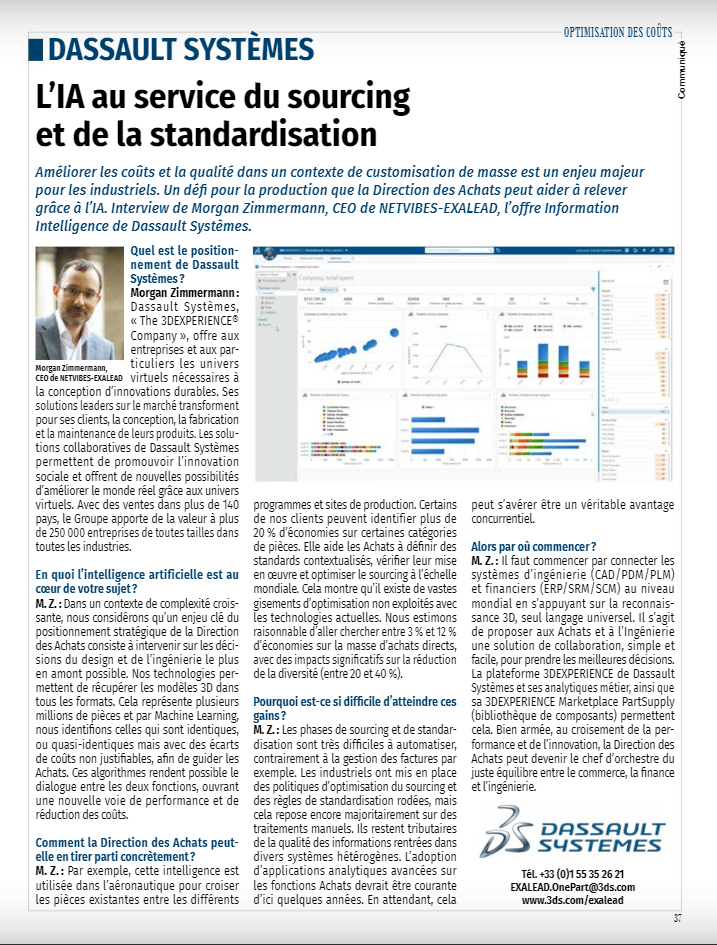This “Artificial Intelligence for Sourcing and Standardization“ interview of NETVIBES-EXALEAD CEO Morgan Zimmermann was featured in Le Figaro magazine’s “Cost Optimization” Partner report in France and is also online in the “Cahier Partner”.
For English readers, the Le Figaro article below was very much inspired by one published previously in the major Procurement magazine in France “Décision Achats” in 2018. Here is its translation:
There’s a lot of talk about artificial intelligence, but what exactly do we mean by it?
In the context of increasing complexity, it is strategically important that the procurement department participate in design and engineering decisions as early as possible – and artificial intelligence can empower them to do that. Here we’re talking about machine learning algorithms, placed at the heart of engineering professions, but led by procurement. These algorithms make it possible for the two departments to communicate, opening new paths to performance and cost reduction.
Procurement has a great opportunity to take advantage of this. For example, in aerospace, this intelligence is used to cross-reference existing parts between different programs and production sites. This helps procurement to define contextualised standards, verify their implementation, and optimise sourcing on a global scale. The gains realised free up capacity for innovation, which is indispensable for the future of industry.
EXALEAD Sourcing & Standardization Intelligence, powered by Dassault Systèmes’ 3DEXPERIENCE platform, is a business discovery application for parts that reveals engineering and procurement related information. In doing so, it helps procurement professionals to level the playing field with suppliers through rapid visibility and comparison of parts hidden anywhere inside the enterprise.
It gives procurement teams their own support tool, as purchasers have their own dashboard which also acts as a point of entry to engineering. Our algorithms use 3D part signature as a universal language in order to help them better understand engineering requests, analyse past purchases and identify all possible commonalities with a new ones.
Leveraging these tools has yielded impressive results for our clients. For example, a Tier 1 supplier in the aerospace industry estimated savings of €15 million per year; and an industrial machinery manufacturer estimated €65 million per year. These examples illustrate the savings that are already being achieved by organisations, which are taking advantage of artificial intelligence. But they also go a lot further: they underline the extensive opportunities that are not being realised by organisations using current technologies.
These savings are difficult to achieve because unlike managing billing, for example, the phases of sourcing and standardisation are difficult to automate. Industrial companies will say they have put in place sourcing optimisation policies and have proven standardisation rules. But this relies mostly on manual processing. Ultimately, they remain dependent on the quality of the information entered in diverse heterogeneous systems.
Artificial intelligence enables companies to eliminate the disconnects between engineering and business systems, improve data quality and standardisation, and provide the user experience and search tools that empower employees to find the information they need, quickly and securely.
According to a study by The Hackett Group, the adoption of advanced analytics applications by procurement functions will be common in two or three years. Now is the time for organisations to position themselves to gain a competitive advantage.
To achieve this, organisations need to begin by connecting their engineering (computer-aided design, product development management, product lifecycle management) and finance (enterprise resource planning, supplier relationship management, supply chain management) systems at a global level by relying on 3D recognition, the only universal language. Then, they need to propose a simple, collaborative solution to procurement and engineering departments that will enable them to make the best decisions.
The 3DEXPERIENCE platform from Dassault Systèmes and its analytics solutions, as well as the 3DEXPERIENCE Marketplace PartSupply (parts library), can help. Well-armed, at the intersection of performance and innovation, the procurement department can orchestrate the right balance between business, finance and engineering.


